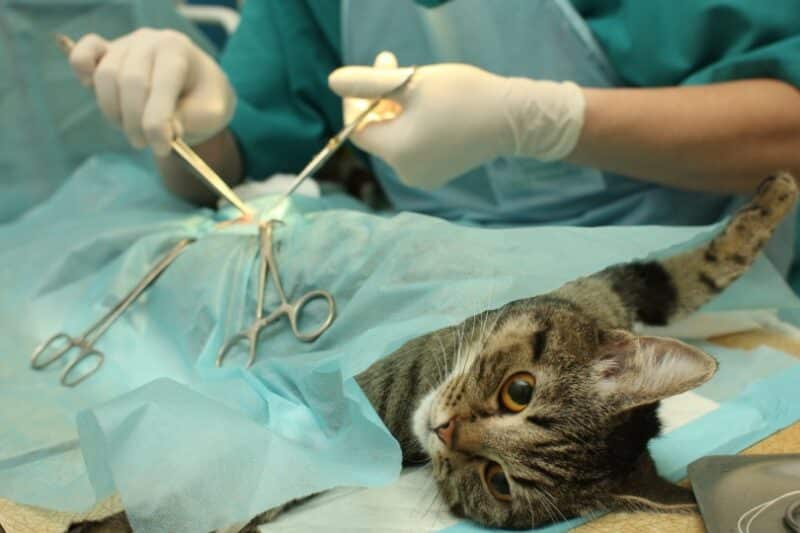[ad_1]
Spaying is a common practice for many pets. While complications are rare, it’s still important for cat owners to know how to respond to them in case something goes wrong. One of the most common complications is slight opening of the incision. While minor openings usually aren’t causes for alarm, you should still contact or visit your veterinarian just to be safe. Your veterinarian can determine if the incision requires additional attention.

How Are Spay Incisions Closed?
Most spay incisions are closed with sutures. Once the spay surgery is completed, veterinarians will close the incision spot with sterilized stitches. Those sutures may be visible or buried in the layers of the skin. Most cats don’t face complications with recovering from spay surgery.

What Does a Spay Incision Look Like?
A healthily recovering spay incision site will appear pink or slightly red during the first few days. You may also see some bruising around the incision, and this bruising can appear a couple of days after the surgery. Small amounts of bleeding from the incision are also normal, as long as it’s within 24 hours of the surgery.
Any excessive swelling or lumpiness, redness lasting past the first few days, bleeding or oozing or odor should be looked at by a veterinarian.

What Causes Spay Incisions to Open?
Most causes of spay incisions opening are attributed to overactivity. Jumping, running, and excessive stretching can cause incisions to open and bleed. Therefore, it’s recommended for cats to rest for 7 to 14 days to give time for the incision to heal. Also, keep in mind that sutures for spay incisions need to remain in place for at least 10 to 14 days. If your cat has buried sutures, they will absorb and there’s no need to remove them. Ask your vet if you have any questions about your cat’s spay incision sutures.
Licking or scratching at the incision can also cause it to open. If your cat is persistent about touching the incision site, you can have them wear an Elizabethan collar or cover the incision with a surgery recovery suit until healed.
Lastly, it’s important not to bathe your cat or get the incision wet while it heals. Disinfectants, creams, and ointments shouldn’t be applied to the incision unless they’ve been prescribed by your veterinarian. Products containing hydrogen peroxide or alcohol can cause cell damage and slow down the healing process.

When Should I Be Concerned About Open Spay Incisions?
It’s best to notify your veterinarian if a spay incision is slightly opened. Your veterinarian can examine the incision and determine if it can be left alone or if further treatment is required.
Keep in mind that there are some cases in which you should contact your veterinarian immediately. For example, continuous dripping of blood or other fluids require veterinary care. You should also contact your veterinarian right away if you notice excessive swelling or redness around the incision or if your cat has removed the sutures on their own. Any discharge and bad odors require medical attention as well.

Conclusion
Overall, it’s best to play it safe and contact your veterinarian if a spay incision is opened, even if it seems small. This is because opened incisions can get infected and cause further health complications, as well as take longer to heal. After that, make sure to follow post-surgery care instructions, and your cat should have a full recovery and be up and active within a couple of weeks.
Featured Image Credit: Artmim, Shutterstock
[ad_2]
Source link
